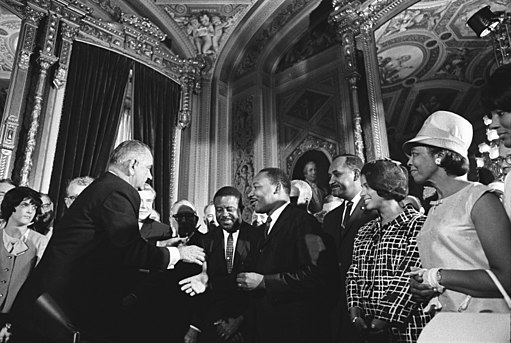Updating the Voting Rights Act Is Good Politics for the GOP
Posted on May 16, 2014

At the end of the day, it’s all about turnout.
Which side is best able to turn out their voters? And what are the best ways to diminish excitement on the other side?
I have always held that the best way to win elections is to actually get some accomplishments under your belt.
If you work hard and do your job and deliver for your constituents, you will probably win reelection.
That being said, both sides go to extreme lengths to drive turnout on their side while diminishing turnout on the other side.
Democrats have been playing in Republican primaries for years, because they think the best way to diminish turnout on the GOP side is to help the Republicans to select inferior candidates.
Harry Reid did that very effectively when he worked to get Sharron Angle to win the nomination. Angle was probably the only candidate that could have possibly lost to the unpopular Reid, and the Majority Leader skillfully made certain that his opponent in the general election was the deeply flawed Angle.
Claire McCaskill had horrible poll ratings in her reelection, so she worked hard to make sure that Todd Akin was her opponent. It worked, and now we all know how flawed a candidate Akin turned out to be.
As Democrats try to diminish Republican turnout, they also try to excite their base.
They usually do that by playing the race card. In 1996, they spread rumors that the Christian Coalition was somehow involved in fires at several black Churches, set by arsonists.
In 2012, they made a big deal about voting suppression, implying that Republicans were trying to take away the right to vote from African Americans. Al Sharpton went on MSNBC every night, talking about how the Republicans and their efforts to crack down on voting fraud was just an effort to stop black people from voting.
It didn’t matter if it was true or not. It served the purpose of exciting a key constituency in the Democratic base, and as it turned out, African Americans had their highest voting percentage in history.
Republican politicians didn’t help themselves with the story line. One Pennsylvania legislator was actually quoting as saying that a new law that had passed in the Quaker State to crack down on fraud would help Republicans win elections, giving plenty of fodder for the Democratic base to chew on.
I have a suggestion for the Republicans. Instead of doing something that riles up the Democratic base, how about they do something that takes a key argument out of their hands?
Jim Sensenbrenner has an update to the Voting Rights Act that he has introduced in the House.
It’s a bipartisan bill, and it includes not only an update to the formula that the Supreme Court said needed updating but specifically says that voting identification laws can’t be thrown out based on the Voting Right Act.
That’s a pretty big victory for conservatives who are concerned about election fraud.
The Roberts Court found that while most the Voting Rights Act was constitutional, that the formula that determined who needed pre-clearance from the Department of Justice in order to change election laws needed to be updating.
That's pretty much what the Sensenbrenner bill does and it would make plenty of sense if the House took up this common-sense bill before the next election.
To be clear, it probably wouldn't matter that much to House races whether the Congress takes this up, because so few House Republican districts have large minority populations.
But it could make a big difference in Senate races, and more importantly, it could have a huge impact in the Presidential race of 2016.
It just makes plenty of sense to get this over with now.
The Republican Party got its start by fighting slavery in the 1860’s. In the 1960, without the support of Republican Leaders in the House and the Senate, the Congress would never have passed the Voting Rights Act fifty years ago.
Fighting for fair voting laws and for the end of racial discrimination in voting is woven in the DNA of the GOP.
And getting this thing done this year makes plenty of sense from a political perspective. It takes voting rights off the table as a political bludgeon to be used against the Republican Party.
